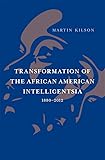Transformation of the African American Intelligentsia, 1880-2012 / Martin Kilson.
Material type: TextSeries: The W. E. B. Du Bois Lectures ; 15Publisher: Cambridge, MA : Harvard University Press, [2014]Copyright date: ©2014Edition: 23 tablesDescription: 1 online resource (248 p.) : 23 tablesContent type:
TextSeries: The W. E. B. Du Bois Lectures ; 15Publisher: Cambridge, MA : Harvard University Press, [2014]Copyright date: ©2014Edition: 23 tablesDescription: 1 online resource (248 p.) : 23 tablesContent type: - 9780674283541
- 9780674416406
- African American intellectuals
- African American leadership
- African Americans -- Intellectual life -- 19th century
- African Americans -- Intellectual life -- 20th century
- African Americans -- Intellectual life -- 19th century
- African Americans -- Intellectual life -- 20th century
- African Americans -- Race identity
- Elite (Social sciences) -- United States -- United States
- Elite (Social sciences) -- United States
- SOCIAL SCIENCE / Ethnic Studies / African American Studies
- 305.896073
- E185.89.I56 .K55 2014
- online - DeGruyter
- Issued also in print.
| Item type | Current library | Call number | URL | Status | Notes | Barcode | |
|---|---|---|---|---|---|---|---|
 eBook
eBook
|
Biblioteca "Angelicum" Pont. Univ. S.Tommaso d'Aquino Nuvola online | online - DeGruyter (Browse shelf(Opens below)) | Online access | Not for loan (Accesso limitato) | Accesso per gli utenti autorizzati / Access for authorized users | (dgr)9780674416406 |
Browsing Biblioteca "Angelicum" Pont. Univ. S.Tommaso d'Aquino shelves, Shelving location: Nuvola online Close shelf browser (Hides shelf browser)

|

|

|

|

|

|

|
||
| online - DeGruyter The Temptation of Despair : Tales of the 1940s / | online - DeGruyter The Power of Market Fundamentalism : Karl Polanyi's Critique / | online - DeGruyter The Tupac Amaru Rebellion / | online - DeGruyter Transformation of the African American Intelligentsia, 1880-2012 / | online - DeGruyter Virtues of Thought : Essays on Plato and Aristotle / | online - DeGruyter Wallace, Darwin, and the Origin of Species / | online - DeGruyter We the People. Volume 3, We the People ; The Civil Rights Revolution: / |
Frontmatter -- CONTENTS -- Foreword by Henry Louis Gates Jr. -- PROLOGUE: The Origins of the Black Intelligentsia -- 1. The Rise and Fall of Color Elitism among African Americans -- 2. Black Intelligentsia Leadership Patterns -- 3. Ideological Dynamics and the Making of the Intelligentsia -- 4. Black Elite Patterns in the Twenty- First Century -- APPENDIX: Class Attributes of Elite Strata -- Notes -- Analytical Bibliography -- Acknowledgments -- Index
restricted access online access with authorization star
http://purl.org/coar/access_right/c_16ec
After Reconstruction, African Americans found themselves free, yet largely excluded from politics, higher education, and the professions. Drawing on his professional research into political leadership and intellectual development in African American society, as well as his personal roots in the social-gospel teachings of black churches and at Lincoln University (PA), the political scientist Martin Kilson explores how a modern African American intelligentsia developed in the face of institutionalized racism. In this survey of the origins, evolution, and future prospects of the African American elite, Kilson makes a passionate argument for the ongoing necessity of black leaders in the tradition of W. E. B. Du Bois, who summoned the "Talented Tenth" to champion black progress. Among the many dynamics that have shaped African American advancement, Kilson focuses on the damage--and eventual decline--of color elitism among the black professional class, the contrasting approaches of Du Bois and Booker T. Washington, and the consolidation of an ethos of self-conscious racial leadership. Black leaders who assumed this obligation helped usher in the civil rights movement. But mingled among the fruits of victory are the persistent challenges of poverty and inequality. As the black intellectual and professional class has grown larger and more influential than ever, counting the President of the United States in its ranks, new divides of class and ideology have opened in African American communities. Kilson asserts that a revival of commitment to communitarian leadership is essential for the continued pursuit of justice at home and around the world.
Issued also in print.
Mode of access: Internet via World Wide Web.
In English.
Description based on online resource; title from PDF title page (publisher's Web site, viewed 30. Aug 2021)


